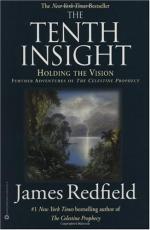
|
| Name: _________________________ | Period: ___________________ |
This test consists of 5 short answer questions, 10 short essay questions, and 1 (of 3) essay topics.
Short Answer Questions
1. Who had Williams intended to meet in his most recent life?
2. What is the dream about?
3. Who does the narrator encounter where he goes?
4. How does Long Eagle think he may connect with other dimensions?
5. How can the narrator alter his experience of pain?
Short Essay Questions
1. What does Long Eagle say about Charlene?
2. What does Wil and the narrator become aware of in Maya's dream?
3. What does Wil say might be the reason no one fully understands the Tenth Insight?
4. What does the narrator do that injures him and why did he do it?
5. What does Maya say about healing?
6. What does Wil tell the narrator is the reason for him disappearing in Peru?
7. What does Long Eagle tell the narrator about the valley?
8. What does Wil say about what he is meant to learn?
9. What does the narrator learn in his encounter with Joel Lipscomb?
10. What does Wil and the narrator realize about where they are and what do they see Joel experiencing?
Essay Topics
Write an essay for ONE of the following topics:
Essay Topic 1
The narrative of The Tenth Insight takes both the narrator and the reader deeper into what is becoming a carefully entwined blend of story and theme. What happens, and how, blends with why to create a portrait of existence that might not be entirely new in its core principles but which, it could be argued, IS new in terms of its perspectives on those principles.
1. How do you think the story and the theme in this novel are blended? Use examples from the text to support your answer.
2. What do you think the second sentence above means? Use examples from the text to support your answer.
3. What do you see is the primary theme in this novel? Use examples from the text to support your answer.
Essay Topic 2
On the second (spiritual) level of analysis, Chapter 2 introduces the key concepts of the Group of Seven and the Fear, both of which define and motivate the action to follow. Of the two, the Fear is perhaps the more significant, in that as a concept, its influence (according to the book's spiritual perspective) reaches beyond the boundaries of the narrative and into the way the world functions. It is in many ways a spiritual antagonist, if not THE spiritual antagonist, to the enlightenment sought by the characters.
1. Why do you think the Fear could be called the spiritual antagonist to the enlightenment sought by the characters. Use examples from the text to support your answer.
2. Many religions and philosophies state emphatically that love is the key to the evolution, spiritual advancement or solution to the problems of humanity. There are also those who say fear is the opposite of love. In this context, explain the ways in which the Fear has impeded human evolution. Use examples from the text to support your answer.
3. Explain the key concepts of the Group of Seven and how you think these concepts would be able to overcome the Fear as it is defined by this book.
Essay Topic 3
The narration creates a sense of mystery, engaging the reader in the narrator's quest for truth. In this case, there are two different truths - what happened to Charlene, and what is the nature of the Tenth Insight.
1. Explain what you think the above statements mean. Use examples from the text to support your answer.
2. Using just the text from the first chapter, argue whether the search for Charlene is the most important aspect of the story or the nature of the Tenth Insight.
3. Explain what about the sense of mystery in the first chapter goaded you to continue reading the book. Use examples from the text to support your answer.
|
This section contains 1,133 words (approx. 4 pages at 300 words per page) |

|




